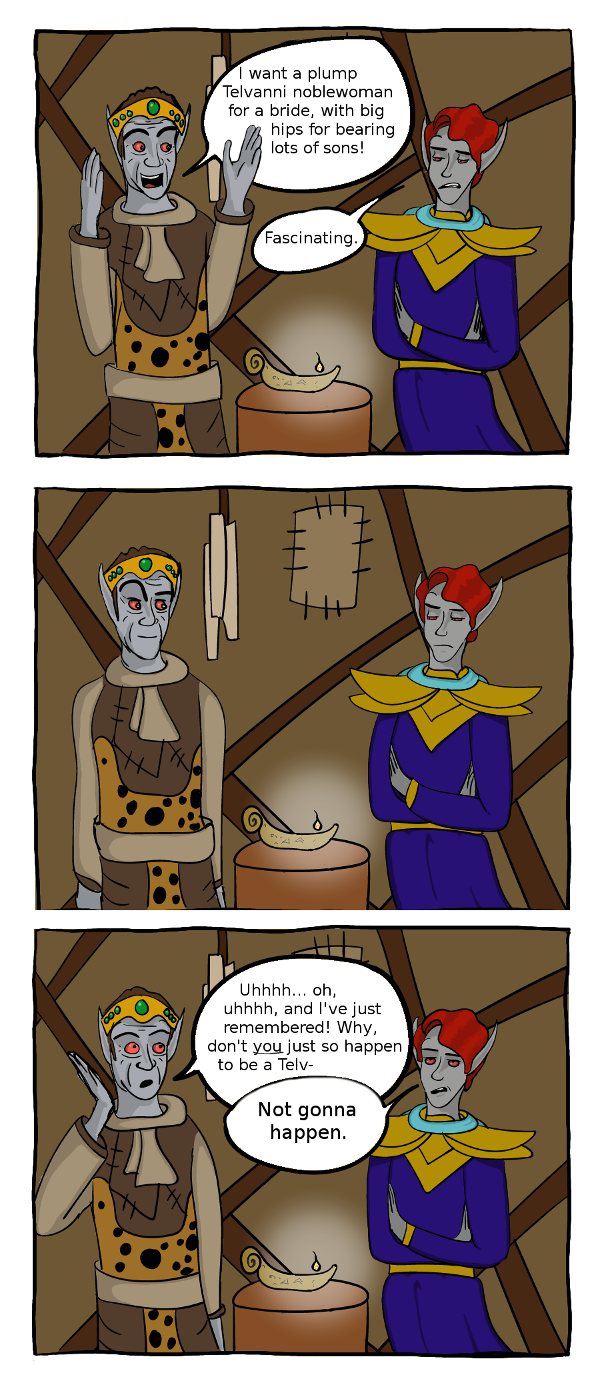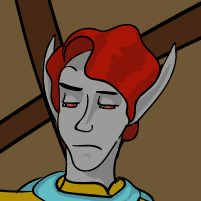This is mostly a compilation of my thoughts and observations on gender and gender politics of Dunmeri society in Morrowind.
In Morrowind, and Dunmeri society especially, gender politics are very culturally heterogeneous with a strong geographic component (due to House rule having a strong correlation to geography – Houses in Morrowind are like a combination of states and political parties), so how individual Dunmer think of and relate to gender varies depending on their culture and location.
Ashlanders are a very patriarchal and gender-segregated society, and have the sort of philosophy that men and women occupy “different spheres of life”, that should compliment each other like yin and yang. Their gender roles seem to be very rigid, and trades are strongly gendered. They also seem to resent the Ashlander women who reject the patriarchal rules and run off to become witches that worship the great cosmic snake that makes men tremble like maidens.
Redoran are also incredibly patriarchal and perhaps this is due to their intentional imitation of “the traditional ways of the Dunmer” and therefore are trying to model their society on Ashlander tradition. Their emphasis on traditional martial arts and physical combat could maybe be why they downplay the role of women as warriors. They also seem to emphasize family very strongly, and politicians seem to do better if they have wives and children (the only woman councilor is an interim councilor because her husband – the previous councilor – died, so honestly it seems like Redoran generally believe politicians should be men). This emphasis on raising of children seems to make it difficult for women to get ahead in Redoran society. However, Redoran society is not nearly as gender segregated as Ashalnder. At the lowest ranks, the parity is OK, but there’s a very sharp rate of attrition as you go up in the ranks and Redoran women hit that glass ceiling.
I also want to point out, that they reference this directly in the Redoran Stronghold questline. The Captain of your guard tells you that his men are concerned that they will not be able to find wives if they’re stationed at your settlement, because it is all dudes there. You then have the choice of going and convincing unmarried women to move to your settlement, or you can buy a bunch of slaves for your men to marry. Wonderful.
Hlaalu seems to have OK gender parity, but it isn’t perfect. Fairly close. But women at some of the higher ranks seem to enjoy less status and influence than their male peers (the female councilors, Nevena Ules and Velanda Omani are both completely beholden to Duke Vedam Dren and basically vote however he tells them), but there certainly isn’t as hard of a glass ceiling as we see in Redoran society. This makes some sense, given their emphasis on trade deals and wealth accrual, that they would have better parity than Redoran but still have issues with intractable “old boy’s clubs” due to generational wealth making change slow.
Telvanni has the best gender parity by far, from the bottom all the way up through the highest ranks. Even their Great Councillor in Ebonheart is a woman. It seems like the Telvanni actually do have something of a meritocracy just as they claim, and do not care about gender. At least not much. They claim to only care about ambition, magical might, cunning, and prowess. Due to the nature of such things, you would expect an equal playing field between men and women, and indeed this seems broadly to be the case. In stark contrast to the Redoran and their afforementioned dude-centric settlement, most of the retainers and minor nobles which move to your settlement at Uvirith’s Grave are women (and they don’t complain to you about not having enough husband prospects, just gonna say).
Also contrasted with the Redoran, the Telvanni do not put any emphasis on family or children. In fact, having a family seems to be a hindrance to a Telvanni politician’s career. The Masters especially appear to have foregone investment in a family in order to focus on their political careers (the men and the women). Which allows for greater gender parity in their society. In addition to not raising families, the Telvanni Masters even traditionally cut off their family names, which I guess could be to emphasize how unimportant family history/influence is to them.
Why are families a hindrance to Telvanni politicians? Dynastic power structures usually aid in stability, and they explain why we get generational transfers of power in the real world – even for elected officials. But I guess Telvanni Masters plan on living forever (or at least thousands of years) through their strange magics, and that takes a ton of pressure off of them for producing heirs. Additionally, the Telvanni have a very strong culture of mentorship / taking proteges. The tradition of a Mouth that legally speaks with their Master’s voice and is binding as such in all things, I think, gives a pretty clear delineation of wealth inheritance in the case that some sort of accident happens and the Master does not live thousands of years (the Mouth doesn’t inherit the council seat, of course, they would have to earn that like anyone else). The Mouth and the Master would both have an incredible amount of influence on each other, with the Master not only providing mentorship and grooming the Mouth for their career in Telvanni politics, but the Mouth would also act as confidant and advisor for their Master and they would inevitably be very close and politically similar. If the Mouth is the traditional inheritor of the Master’s wealth, then having a family could actually make things less stable, because now you have a family which might contest your Mouth’s right to your estate after you die. This would take even more pressure off of Telvanni politicians for producing heirs, and perhaps even dissuade them from it.


